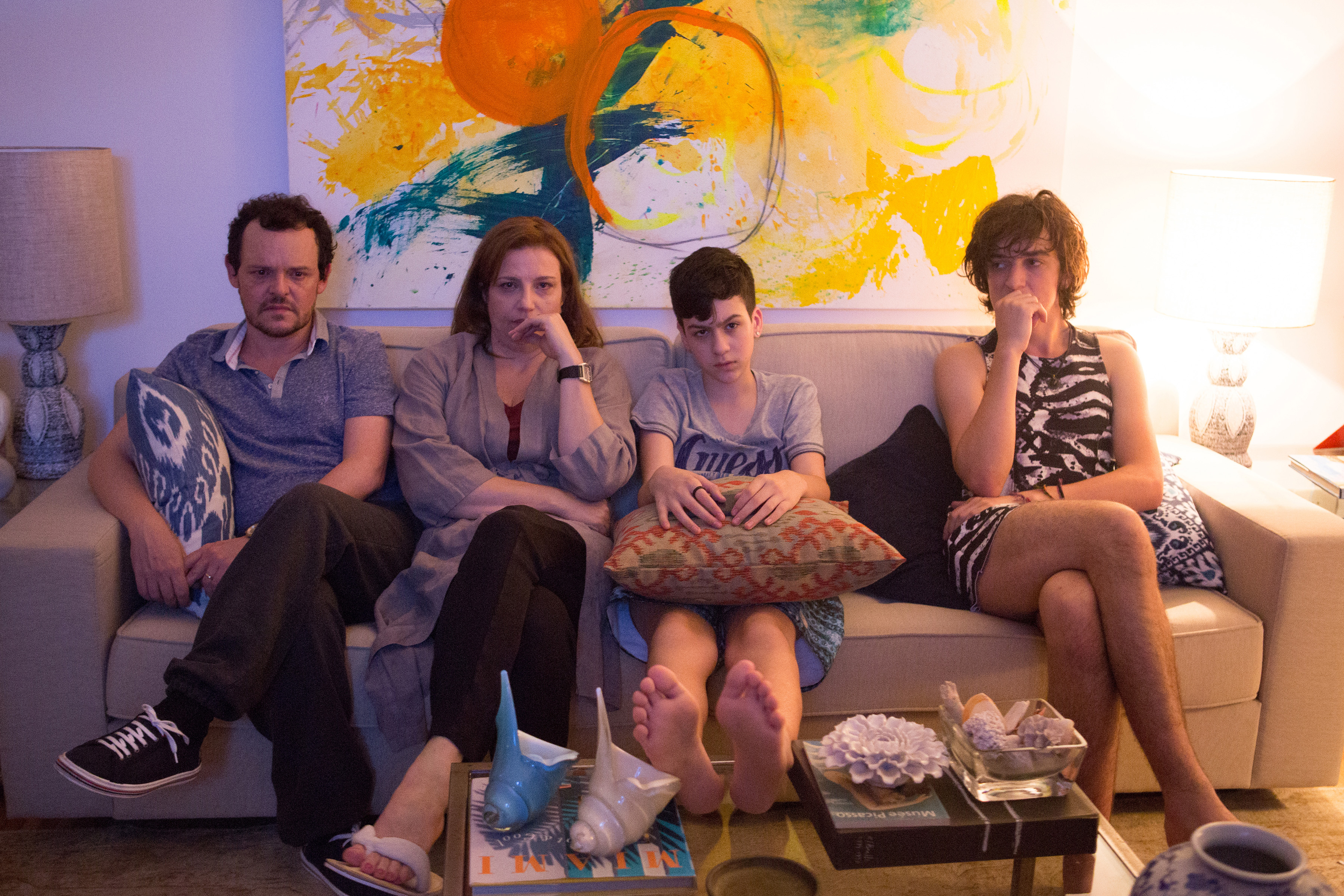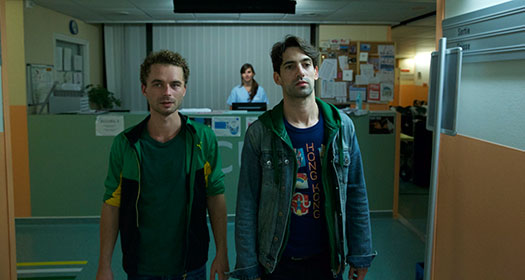NewFest: "Don't Call Me Son", "Esteros", and "Paris 05:59"
 Sunday, October 23, 2016 at 8:38PM
Sunday, October 23, 2016 at 8:38PM NewFest, New York's LGBT Festival, runs through Tuesday. Here's Chris on three of the festival's foreign selections...

Don't Call Me Son
Anna Muylaert continues to explore complex family dynamics in Don't Call Me Son, her follow-up to last year's Brazilian Oscar submission The Second Mother. Teenage Pierre (Naomi Nero) and his younger sister have their lives upended when their mother is jailed for stealing them at birth, thrusting them apart and into the homes of their birth parents. Further complicating the film's identity politics is Pierre's burgeoning gender dysphoria...
The film's insistence on placing itself closer towards the beginning of Pierre's self discovery keeps the gender exploration vague, but makes an inspired parallel struggle to the disorientation and claustrophobia of having a new family forced upon him. The pressures of his birth parents' (Matheus Nachtergaele and Luciana Paes) affection only isolates him further, their emotional expectations and higher economic class coming with a fair share of baggage. There's something about the unknowability of parents, especially when you barely know yourself, that Muylaert gets so very right. The emotional distance kept between the audience and each of the parents is vast even though they are the ones with more emotionally expressive.
However, while Muylaert creates a layered world around her lead, Pierre himself is somewhat of a cipher beyond his situation - the film is brief but you leave it knowing Pierre perhaps the least of its characters. While the film intrigues it still feels incomplete in both narrative and character, like a solid pilot for a longer series with more to come. Grade: B-

Esteros
Esteros is a similar narrative we've seen before in LGBT film: childhood friends Matías (Ignacio Rogers) and Jerónimo (Esteban Masturini) reunite by chance and must face the fallout of their shared teenage sexual awakening. What follows is an expected dance of "will they or won't they?" as we flash back to their childhood bond, and build to the climactic event. But while there is little narrative surprise, the film excels on its sensitive portrayal and confident approach.
Rogers and Masturini's performances maintain the tension within the familiar - Rogers all pinched, thawing defences to Maturini's soul and loin piercing gaze. There's real consequence behind their potential rekindling (including Matías's girlfriend), but as delivered by these actors, the real danger is in two hearts broken anew. While their child actor counterparts are natural and thankfully believable as younger versions of the grown up actors, the film is rewarded by placing the heavy lifting on Rogers and Masturini's shoulders. But with its abrupt ending, the film cuts off the kind of catharsis and emotional response it strives for, ultimately denying the breathing room that makes its earlier chapters so successful. Grade: B

Paris 05:59
In a prolonged opening sequence, Paris 05:59's Théo and Hugo meet at a basement sex club in the wee hours of the morning. After their instant attraction leads Théo to absentmindedly forget the condom, their fast connection turns to sudden panic when Hugo discovers the mistake and reveals his positive HIV status. The film unfolds in real time with wavering urgency, from post-coital flirtation to anxiety to renewed hope. The experience of watching these men get to know one another and maybe fall in love engages as much as it repeats itself.
The film is admirable for its exploration of internalized sexual guilt, but it explores the high of sexual satisfaction contrasted with potential risks in surface (perhaps slut-shaming) ways. There's a sudden monologue late in the film about the stories of everyday people of the city delivered by a hotel maid - you'll leave it wishing there was as much insight into the humanity of Théo and Hugo as there is to this woman. The central men and the commonality of their experience remain mostly unilluminated. Grade: C



Reader Comments (8)
I would give Paris 05:59 a B+ just for existing.
I liked Paris 05:59 much more. I didn't see it so much as slut shaming so much as just demonstrating a very real scenario that most gay men find themselves in and highlighting the ways that for most the traditional hetero romance tropes don't apply for gay men.
Did you see HAWAII? It was a favourite of mine a few years back and sounds very much like ESTEROS. I'm keen to see that one though.
The experience of watching these men get to know one another and maybe fall in love engages as much as it repeats itself.
You nailed Don't Call Me Son
I was looking forward to Paris 5.59 but for me it was an outright atrocity. That orgy scene was endless and crafted without any feeling for cinema or rhythm or visuals or psychology or, hell, even basic titillation. The world's most unsatisfying and pretenious 18 minute porno. The rest of the was runtime padded with purple dialogue and pretty tacky emoting. Easily among the lowlights of the year.
I didn't see Don't Call Me Son but I did finally force myself to watch The Second Mother just th other week. Boy, was I glad to!
I had thought it would be one of those suffocatingly heartwarming dramedies aimed squarely at senior women who like to do luncheon at the arthouse cinema. And while I'm sure it would satisfy that audience as well, I loved how stacked the script was with both psychological and social density and also how it was built on such an absorbing and beautifully put together web of relationships. And that lead performance was monumental.
Glenn - there was just something to the emotional punishment to PARIS that didn't sit well with me, and I'm not sure it's what the film is actually going for
goran - agreed on the dialogue, but I think there's something to the overstylizing of the opening that does impact the overall film in an interesting way
I loved the orgy scene. Certain shots are a clear homage to Pierre et Gilles.
Thanks for sharing this loved to read this. Keep sharing your knowledge with us.
https://192-168-1-254ip.com/